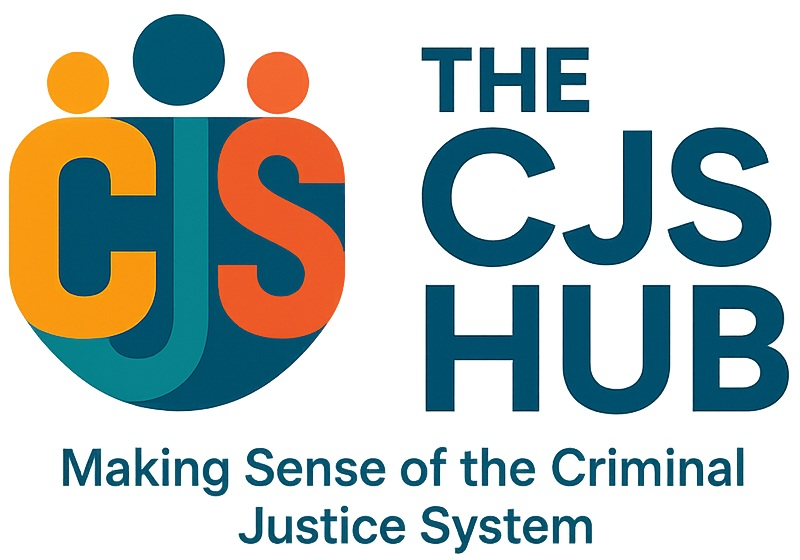Our guides are available to view for free, providing you with general signposting and guidance. At the bottom of every page you will find a link to message us. Please don’t feel isolated or confused reach out and we will get back to you as quickly as possible.
Sentencing Options Explained
Why Sentencing Happens
If you plead guilty or are found guilty after trial, the court has to decide what happens next. Sentencing isn’t just about punishment — it also aims to protect the public, rehabilitate offenders, and deter future offending.
Sentences can feel complex, but in most cases, they fall into one of a few main categories. Knowing the basics can make things clearer for you and your family.
Discharge — No Punishment, But Still a Record
Absolute Discharge:
- The court decides no punishment is needed.
- Rare, but can happen for very minor offences or where blame is minimal.
Conditional Discharge:
- No immediate punishment if you stay out of trouble for a set period (up to 3 years).
- If you commit another offence during that time, you can be sentenced for both.
Fines
- Fines are common for minor offences, especially in Magistrates’ Court.
- The amount depends on the seriousness of the offence and your ability to pay.
- The court can set payment plans if you can’t afford the full amount up front.
- Not paying fines can lead to enforcement action — even prison in extreme cases.
Community Orders
Community orders are designed to punish but also rehabilitate. The court can impose one or more “requirements,” such as:
- Unpaid Work (Community Service) — typically 40 to 300 hours, supervised.
- Rehabilitation Activity Requirements (RARs) — meetings, courses, or therapy aimed at addressing offending behaviour.
- Curfews / Electronic Tags — you may have to stay at home during certain hours.
- Exclusion Zones — banning you from certain places.
- Drug or Alcohol Treatment — compulsory testing or programmes if relevant.
Failing to comply can lead to harsher penalties, including custody.
Suspended Sentences
This is where the court imposes a prison sentence but “suspends” it for a set period (up to 2 years).
- You don’t go to prison straight away, but you must comply with conditions (like attending appointments, doing unpaid work, or following curfews).
- If you commit another offence or breach the order, the sentence can be “activated” — meaning you serve the original prison time plus anything for the new offence.
- A suspended sentence is still a criminal conviction and will show on a DBS check.
Immediate Custody (Prison Sentences)
If the court decides your offence is so serious that only prison is appropriate, you’ll be sentenced to custody.
How it works in England & Wales:
- Sentence length: Depends on the seriousness of the offence and your previous record.
- Automatic release:
- Sentences under 12 months → Usually serve half in prison, the rest on licence in the community.
- Sentences 12 months or longer → Usually serve half to two-thirds in custody, depending on offence type.
- Extended sentences → For some violent or sexual offences, you may serve more in prison before release.
- Life sentences & IPPs: Special rules apply, and parole decisions are involved.
Even after release, you’ll normally remain on licence — meaning probation supervises you and you must follow strict rules.
Young People (Under 18)
Sentences for young people are different and aim more at rehabilitation. Options include:
- Referral Orders — meeting with a youth offender panel to agree on a rehabilitation plan.
- Youth Rehabilitation Orders (YROs) — the youth equivalent of community orders, with tailored conditions.
- Detention & Training Orders (DTOs) — a mix of custody and supervised release.
Victim Surcharges, Costs & Compensation
Whatever sentence you receive, the court may also order:
- A Victim Surcharge — a set amount based on your sentence, used to fund victim services.
- Prosecution Costs — contributing towards the CPS’s costs.
- Compensation Orders — paying money directly to victims.
These are in addition to any fines or other penalties.
How Courts Decide: Sentencing Guidelines
Judges and magistrates follow official Sentencing Council guidelines. They look at:
- The seriousness of the offence.
- Any aggravating factors (weapons, repeat offending, targeting vulnerable victims).
- Any mitigating factors (genuine remorse, previous good character, mental health issues).
- Whether you pleaded guilty early.
Every case is different, but these rules keep sentences broadly consistent across England and Wales.
Practical Tips for Defendants & Families
- Ask your solicitor to explain likely sentencing ranges before trial or plea.
- If you’re worried about custody, ask about pre-sentence reports — these can influence whether you get community-based options.
- Make arrangements for children, pets, bills, and work before sentencing day if there’s a chance of custody.
- If you get a community or suspended sentence, stick to the conditions — breaching them makes things much worse.
